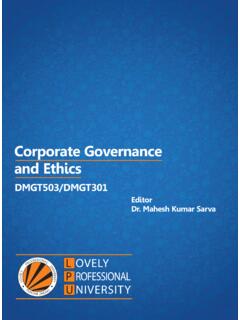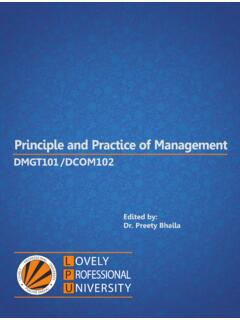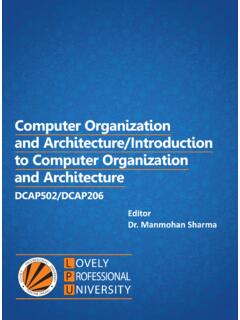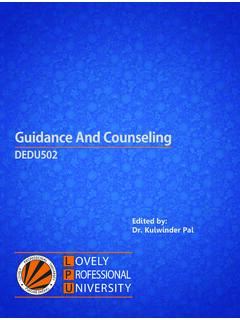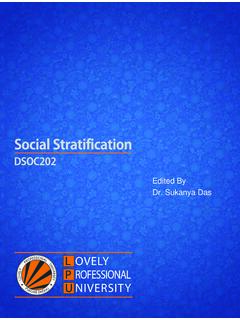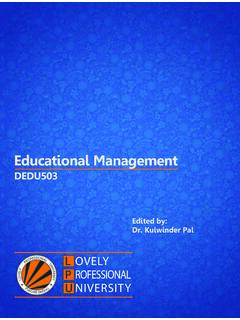Transcription of Corporate Governance and Ethics
1 Corporate Governance and EthicsDMGT503/DMGT301 EditorDr. Mahesh Kumar Sarva OF DISTANCE EDUCATIONCORPORATE GOVERNANCEAND ETHICSE dited ByDr. Mahesh Kumar SarvaISBN: 978-93-87034-69-3 Printed byEXCEL BOOKS PRIVATE LIMITEDRegd. Office: E-77, South Ext. Part-I, Delhi-110049 Corporate Office: 1E/14, Jhandewalan Extension, New Delhi-110055 +91-8800697053, +91-011-47520129 forLovely Professional UniversityPhagwaraCONTENTSUnit 1:1 Unit 2:18 Unit 3:52 Unit 4:77 Unit 5:96 Unit 6:126 Unit 7:149 Unit 8:174 Unit 9:195 Understanding Corporate GovernanceAshwani Panesar, Lovely Professional UniversityConcepts of Corporate GovernanceGopikaJuneja, Lovely Professional UniversityCorporate Governance and StakeholdersAmit Kumar Sharma, Lovely Professional UniversityBoard of Directors: A Powerful Instrument in Governance Megha Mehta,Lovely Professional UniversityRole and Responsibilities of AuditorsMegha Mehta, Lovely Professional UniversityCodes and Guidelines of Corporate GovernanceAmit Kumar Sharma, Lovely Professional UniversityBusiness Ethics and Corporate Social Responsibility Mridula Mishra, Lovely Professional UniversityEnvironmental Concerns and Corporations Gopika Juneja, Lovely Professional UniversityMedia and Corporate GovernancePretty Bhalla, Lovely Professional UniversityUnit 10:Monopoly, Competition and Corporate Governance209 Pretty Bhalla, Lovely Professional UniversityUnit 11:The Indian Capital Market Regulator SEBI230 Ashwani Panesar, Lovely Professional UniversityUnit 12.
2 Government in Transition Economies (including IRDA, AMFI and Commodity Exchange)244 Babli Dhiman, Lovely Professional UniversityUnit 13:257 Corporate Governance in Indian Scenario Gopika Juneja, Lovely Professional UniversityUnit 14:264 Corporation in a Global SocietyTanya Nagpal, Lovely Professional UniversitySYLLABUSC orporate Governance and EthicsObjectives: The course provides an insight into the Corporate Governance practices & codes to be followed by the & external Corporate Governance practices & problem s faced by the stakeholders & company will be No. Description 1 Understanding Corporate Governance : Corporate Governance an overview , History of Corporate Governance 2 Concepts of Corporate Governance Theory & practices of Corporate Governance , Corporate Governance mechanism and overview land marks in emergence of Corporate Governance 3 Stakeholders: Rights and privileges; problems and protection, Corporate Governance and Other stakeholders 4 Board of Directors: A Powerful Instrument in Governance ; Role and responsibilities of auditors 5 Development of codes and guidelines and summary of codes of best conduct, Banks and Corporate Governance ; Ganguly committee s Recommendation 6 Business Ethics and Corporate Governance .
3 Corporate Social Responsibility: Justification, Scope and Indian Corporations 7 Environmental Concerns and Corporations; Indian Environmental Policy, The Role of Media in Ensuring Corporate Governance ; Ethics in Advertising 8 Monopoly, Competition and Corporate Governance ; MRTP Act and Competition Act, The Role of Public Policies in Governing Business 9 The Indian Capital Market Regulator: SEBI, The Role Of Government in Developing and Transition Economics 10 Corporate Governance in Developing and Transition economies, Corporate Governance : Indian scenario, The Corporation in a Global Society, LOVELY PROFESSIONAL UNIVERSITY1 Unit 1: Understanding Corporate GovernanceNotesUnit 1: Understanding Corporate Corporate Governance : An Definition of Corporate Need of Corporate Scope of Corporate Participants to Corporate Importance and Benefits of Corporate Role of Corporate OECD Parameters and Issues involved in Corporate Historical Perspective of Corporate Self Review Further ReadingsObjectivesAfter studying this unit, you will be able to:Define Corporate governanceState the needa and importance of Corporate governanceDiscuss the issues and benefits of Corporate governanceKnow the history of Corporate governanceIntroductionCorporate Governance is a central and dynamic aspect of business.
4 The term Governance isderived from the Latin word gubernare, meaning to steer , usually applying to the steering of aship, which implies that Corporate Governance involves the function of direction rather thancontrol. In fact, the significance of Corporate Governance for Corporate success as well as forsocial welfare cannot be overstated. Recent examples of massive Corporate collapse resultingfrom weak systems of Corporate Governance have highlighted the need to improve and reformcorporate Governance at international level. In the wake of Enron and other similar cases,countries around the world have reacted quickly by pre-empting similar events Panesar, Lovely Professional University2 LOVELY PROFESSIONAL UNIVERSITYC orporate Governance and EthicsNotes"Capitalism with integrity outside the government is the only way forward to create jobs andsolve the problem of poverty.
5 We, the business leaders are the evangelists of capitalism withintegrity. If the masses have to accept this we have to become credible and trustworthy. Thus wehave to embrace the finest principles of Corporate Governance and walk and the talk." (NarayanMurthy) Corporate Governance has in recent years succeeded in attracting a good deal of public interestbecause of its apparent importance for the economic health of corporations and society ingeneral. However, the concept of Corporate Governance is poorly defined because it potentiallycovers a large number of distinct economic phenomena. As a result, different individuals havecome up with different definitions that basically reflect their special interest in the field. It ishard to see that this 'disorder' will be any different in the future so the best way to define theconcept is perhaps to list a few of the different Corporate Governance : An Definition of Corporate GovernanceCorporate Governance comprehends the framework of rules, relationships, systems andprocesses within and by which fiduciary authority is exercised and controlled in rules include applicable laws of the land as well as internal rules of a include those between all related parties, the most important of which are theowners, managers, directors of the board (when such entity exists), regulatory authorities and toa lesser extent, employees and the community at large.
6 Systems and processes deal with matterssuch as delegation of authority, performance measures, assurance mechanisms, reportingrequirements and and Poors defined Corporate Governance as the way in which a company organizesand manages itself to ensure that all financial stakeholders receive their fair share of a company searnings and assets is increasingly a major factor in the investment decision-making Corporate Governance is often cited as one of the main reasons why investors are reluctant,or unwilling, to invest in companies in certain Governance concerns with the exercise of power in Corporate entities. The OECD provides a functional definition of Corporate Governance as: Corporate Governance is the system by which business corporations are directed and controlled. Thecorporate Governance structure specifies the distribution of rights and responsibilities among differentparticipants in the corporation, such as the board, managers, shareholders and other stakeholders, and spellsout the rules and procedures for making decisions on Corporate affairs.
7 By doing this, it also provides thestructure through which the company objectives are set, and the means of attaining those objectives andmonitoring performance. The report of SEBI Committee on Corporate Governance gives the following definition ofcorporate Governance . Corporate Governance is the acceptance by management, of the inalienable rights of shareholders as thetrue owners of the corporation and of their own role as trustees on behalf of the shareholders. It is aboutcommitment to values, about ethical business conduct and about making a distinction between personal andcorporate funds in the management of a company .The simplest definitions, is given by a Cadbury Report (UK). Corporate Governance is thesystem by which businesses are directed and controlled .LOVELY PROFESSIONAL UNIVERSITY3 Unit 1: Understanding Corporate GovernanceNotesThe Cadbury Committee said, The primary level is the company s responsibility to meet itsmaterial obligations to shareholders, employees, customer, suppliers, creditors, to pay its taxesand to meet its statutory duties.
8 The next level of responsibility is the direct result of actions ofcompanies in carrying out their primary task including making the most of the community shuman resources and avoiding damage to the environment. Beyond these two levels, there is amuch less well-defined area of responsibility, which involves in the interaction between businessand society in a wider sense. The ongoing nature of Corporate Governance indicates by the definition of the Commission onGlobal Governance (1995), A continuing process through which conflicting or diverse interestsmay be accommodated and co-operative action may be taken . Need of Corporate GovernanceA corporation is a congregation of various stakeholders, namely customers, employees,investors, vendor partners, government and society. A corporation should be fair and transparentto its stakeholders in all its transactions.
9 This has become imperative in today s globalizedbusiness world where corporations need to access global pools of capital, need to attract andretain the best human capital from various parts of the world, need to partner with vendors onmega collaborations and need to live in harmony with the community. Unless a corporationembraces and demonstrates ethical conduct, it will not be able to succeed. Corporate governanceis about ethical conduct in business. Ethics is concerned with the code of values and principlesthat enable a person to choose between right and wrong and, therefore, select from alternativecourses of action. Further, ethical dilemmas arise from conflicting interests of the parties this regard, managers make decisions based on a set of principles influenced by the values,context and culture of the organization.
10 Ethical leadership is good for business as the organizationis seen to conduct its business in line with the expectations of all Governance is beyond the realm of law. It stems from the culture and mindset ofmanagement and cannot be regulated by legislation alone. Corporate Governance deals withconducting the affairs of a company such that there is fairness to all stakeholders and that itsactions benefit the greatest number of stakeholders. It is about openness, integrity andaccountability. What legislation can and should do is to lay down a common framework the form to ensure standards. The substance will ultimately determine the credibility andintegrity of the process. Substance is inexorably linked to the mindset and ethical standards ofmanagement. Corporations need to recognize that their growth requires the cooperation of allthe stakeholders; and such cooperation is enhanced by the corporation adhering to the bestcorporate Governance practices.

